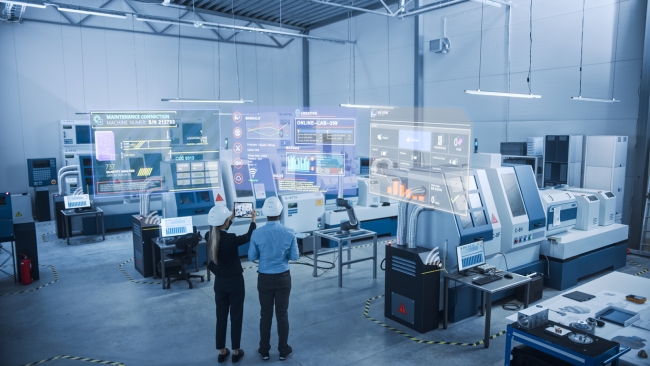2 minute read • published in partnership with Cranfield University
Insight: Digital technologies sound great, but can manufacturers use them?
Productivity is one of the biggest challenges currently facing the UK manufacturing sector. According to data from the ONS, the UK has a long-running nominal productivity gap with the other six G7 economies in both output per hour and output per worker terms. Cranfield University explores how manufacturers can improve productivity and technologies that will support this.
An example of one challenge is that UK workers are 26.2% less productive than their German counterparts meaning that the latter could work a four-day week and still match British output.
Several factors lie behind this data:
• Leadership
• The culture for innovation
• Our ability to adopt new technologies
• Skills within the workforce
To plug the productivity gap, we need to look at how we can improve in these areas.

The digital technologies now available to manufacturers will help to bridge the productivity gap but it’s important to equip people with the right skills and understanding to be able to use them / Picture: Getty/iStock
In particular, how can we adopt and implement the fantastic digital technologies now available in the manufacturing space? It is all very well having an awareness and understanding of these technologies, but they are essentially useless if we are not using them.
Answering this question requires a bespoke approach, tailored to the specific needs of a company – its product, operational processes, and employees – so that new technologies can be designed and developed within the correct context. It also requires a long-term outlook, so that technologies are embedded and evolved over time, rather than implemented as one-off solutions. In this way, we can improve productivity by capitalising on the technologies that are available to us.
It is against this backdrop that the Digital and Technology Solutions Apprenticeship MSc at Cranfield University was created. Situated within the Centre for Digital Engineering and Manufacturing (CDEM), a world-leader in digital engineering, this unique and innovative apprenticeship MSc takes a systems-view to offer awareness and hands-on knowledge to design and develop digital technologies and solutions (including AI/Machine learning, digital twins, AR/VR, data analytics, data management) across industries that rely on complex engineered products and services. We blend technical and managerial skills to promote the creation, adoption, and evolution of digital technologies and solutions. We also take an innovative approach to deliver the course with cutting-edge, blended learning methods.
John Ahmet Erkoyuncu, Professor of Digital Engineering at the CEDM, says: “Digital manufacturing will undoubtably shape our future. There are so many benefits both for nations and organisations, for whom competitive advantage will depend on these transformations. As we move into a more digitalised environment, we will need to be managing data better, delivering whole system level productivity benefits and improvements, and meeting the sustainability targets.”
In this series of articles, we will explore three key areas where new technologies will have the biggest impact:
1 – Data
2 – Modelling
3 – Visualisation
Bridging the productivity gap requires focusing on equipping people with the skills and understanding that they need to benefit from advanced technologies, so that they can go on to develop their own solutions. Knowledge is power and, armed with it, individuals can adapt to the environment that they’re working in and be really targeted in their approach, to design and develop digital solutions that yield real results.
Find out more about the Digital and Technology Solutions Apprenticeship MSc here
